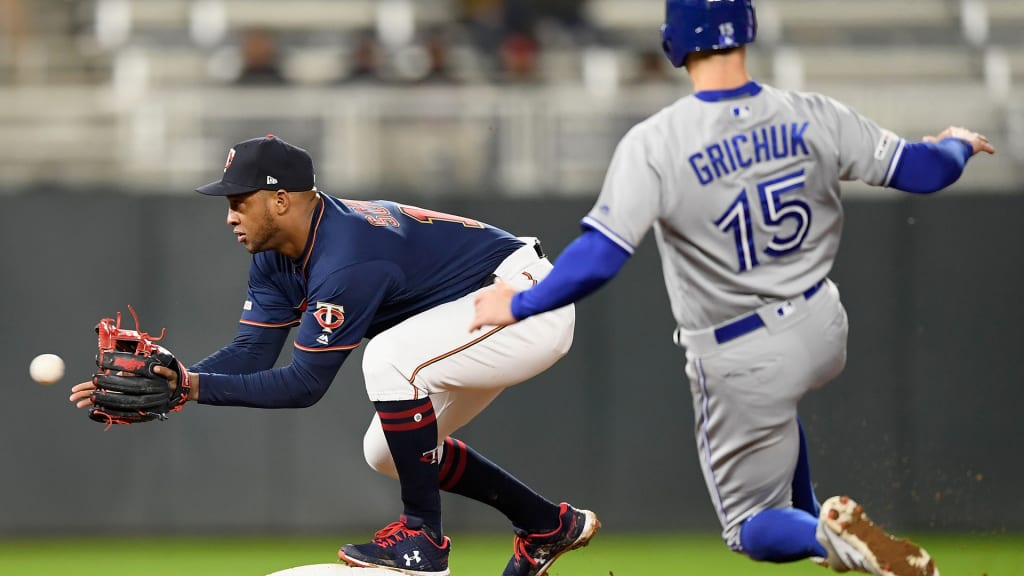
MINNEAPOLIS -- There's certainly an element of frustration that's possible when the Twins' aggressive use of infield shifting results in either hitters reaching on batted balls that might not have otherwise resulted in hits, or when baserunners move up on plays where they might have otherwise been erased.
But even after the Twins got unlucky on Tuesday night when two of those plays bunched together as part of the Blue Jays' game-winning rally in the seventh inning, manager Rocco Baldelli acknowledged the sometimes frustrating results, but remained steady in the belief that the shifts, even with runners on base, will result in positive outcomes more often than not.
"There's no easy answer to it, because that kind of stuff does happen, and sometimes, they happen in bunches, which makes it even more challenging to deal with at times," Baldelli said. "But we're just going to continue to do what we think is right."
The Twins were already third in the Majors last season by using infield shifts on 28.5 percent of plate appearances, but they have pushed further ahead in 2019, shifting on 45.8 percent of plate appearances, including a league-leading 38.1 percent of plate appearances against right-handed hitters.
Though six teams have employed shifts on at least 40 percent of their plays this season, only two -- the Twins and Marlins -- have done so with runners on base. Minnesota leads the Majors in shifts with runners on base, shifting in 43.1 percent of such situations.
"I'm pretty sure that the way I feel about it is we're going to win more games if we do what we're doing while also acknowledging that there are situations that come up that are frustrating," Baldelli said.
In Tuesday's seventh inning, Eric Sogard reached on a one-out single before Freddy Galvis grounded into what could have been an inning-ending double play, but because second baseman Jonathan Schoop was shifted to the right of second and had to move away from the bag to make the play, the Twins only got one out at second base.
"There are going to be times where we're not going to be able to turn a double play because we want to catch the ground ball initially, because there are a lot of times when if we're not playing where we think we should be playing and they hit the ball right where we think we should have been, we're not going to get any outs," Baldelli said. "So it's taking one out instead of zero outs is really what it comes down to."
Later in the inning, with Minnesota again shifted to the right side of the infield against Justin Smoak, Sogard stole third base uncontested after noticing nobody was in position to cover the bag.
The Blue Jays made the Twins pay with Teoscar Hernandez's go-ahead two-run single to end the frame, but in general, Minnesota still wants to take advantage of playing where it feels the ball will be hit, even given the possible baserunning ramifications with men on base.
"It's a risk that we're willing to accept," Schoop said.
Schoop said that the Twins have been practicing such situations since Spring Training, and third baseman Marwin Gonzalez, who came from the Astros, said that Minnesota practices those situational grounders every day.
They acknowledge that they might sometimes end up out of position, but the Twins haven't been negatively impacted by those shifts to a significant extent, either. Minnesota has allowed a .239 batting average when shifted with men on base, the 15th-highest mark in the Majors, putting it firmly in the middle of the pack.
"Sometimes, it's not going to work and you're going to be disappointed whenever it doesn't work, but you're going to be happy when the ball is hit straight to you," Gonzalez said.
He said it
"I think as long as someone is respecting the guys that are on the field with them, they should be able to do whatever they want. There's a fine line, because in baseball, there's a pitcher-hitter competition going on with every given play. So what a guy does is sometimes directly pointed toward the other people on the field. There are times when a guy can express themselves as a player and do things as long as it's focused on the positives with someone's teammates as opposed to things that are focused toward the other team in any way. ...
"I also believe that players should be able to have a personality and express themselves. They aren't robots. These guys are not machines. Although we like to think they are or decide when they should be and shouldn't be, they're not. They are allowed to have fun out there, too. Just respecting the other people on the field does matter." -- Baldelli, on the altercation between the White Sox and Royals on Wednesday after Tim Anderson celebrated a home run with a bat flip.
